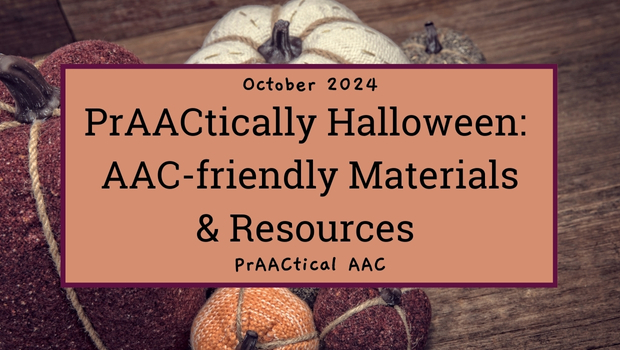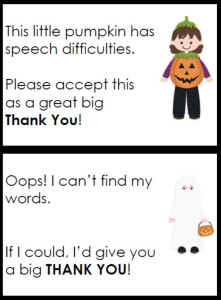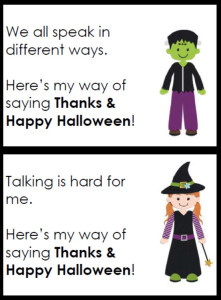PrAACtically Halloween: AAC-friendly Materials & Resources

Looking for some resources to make Pumpkin Day a little more AAC-friendly? Here are some from previous years that might come in handy.
Holidays are special, and Halloween is a favorite among many. As much fun as it is to dress up and get candy, though, there are lots of ways that Halloween can be stressful for AAC learners. From the change in routine, to the costumes and scary decorations, to talking with neighbors and other less familiar communication partners, to the overabundance of sugar, there are lots of ways in which Halloween can trip us up.
If the AAC learners in your life celebrate Halloween, Fall Festival, Harvest Parade, or any other celebration with similar traditions, we SLPs can help them to have a positive experience. Here are some ideas.
- Use a social narrative to prepare everyone for what to expect on and around Halloween. Read them often in the weeks leading up to the school dress-up parade, party, and the big day itself. More Halloween social narratives can be found at Therapics, and One Place for Special Needs.
- If you use PCS check out the social narratives on Boardmaker Online. Remember to tailor the story
 to the specific situation to maximize its effectiveness. Jonah’s family does their trick-or-treating at the mall. Ariana likes to stay home with her Nana to give out the candy. Austin’s dad takes him to a special party at the community center. Each one needs a narrative that fits what they will be experiencing.
to the specific situation to maximize its effectiveness. Jonah’s family does their trick-or-treating at the mall. Ariana likes to stay home with her Nana to give out the candy. Austin’s dad takes him to a special party at the community center. Each one needs a narrative that fits what they will be experiencing. - Everyone loves carving or decorating pumpkins, and now there’s even an app for that. Check out these visual supports by Kris Drum via Boardmaker Online.
- Prepare a choice board of Halloween costume options and let the learner decide on the costume.
- This is a great opportunity to use schedules, an evidence-based strategy that helps learners better understand the expectations. Visual representations help us plan for the change in routine and have a successful experience. Consider making a monthly calendar to use as a countdown to Halloween. You can use mini-schedules to make special Halloween foods or have fun with spooky science concoctions.
- Speaking of recipes, try making a new snack or special treat. There are SO many ways to build language, practice core vocabulary, and use AAC when we prepare food together. Picture recipes are a great way to help the learner understand and participate in the activity. Here are some to get you started.
-
Check out some other resources, such as this Adaptive Cooking Book with Communication Board and the Halloween Spider Cooking Summary by Danielle Loyche via Boardmaker Online
- Take a look at the learner’s AAC system to see what vocabulary and messages can be used and start prAACticing them. There are lots of ways to use those October core words. Since the transactions are often fast-paced, a set of prestored messages might be helpful.
- Or use a special app, like Fat Cat Spooky Chat.
- Make sure the AAC is available and ready to go. Working with students who don’t have an AAC
 system yet? Consider introducing a communication board like this one with both core and activity-specific vocabulary.
system yet? Consider introducing a communication board like this one with both core and activity-specific vocabulary. - Create a mini-schedule to explain what Halloween day will be like. You can represent things like having an early dinner, changing into our costumes, carrying a treat bag, going outside, walking the neighborhood, stopping at houses, knocking on the door/ringing the bell, waiting for them to answer, greeting the person, holding out the treat bag, saying thank you, etc.
- Consider making a visual support to plan the trick-or-treating route. Some AAC learners like to know how many houses they will visit, or how long they will be away.
- When kids can’t speak well or are reluctant to interact with less familiar neighbors, it can feel awkward and stressful for everyone. Cards that explain the situation, like these, can be handed out at each interaction to inform and ease any awkwardness that may arise. You can download the PrAACtical AAC versions shown in this post here.
- Create scripts and prAACtice them to give the AAC learner confidence. You can have one script to practice going out to trick-or-treat and another if the AAC learner is going to hand out candy.
- Don’t forget the safety rules! Holding hands in the street, walking (not running),
- Check out Trick or Treat Using AAC by Deanne Shoyer at Small but Kinda Mighty.
Do you have tricks to make Halloween a successful experience for AAC learners? Please share! We’d love to learn from you.
Filed under: Featured Posts
This post was written by Carole Zangari
